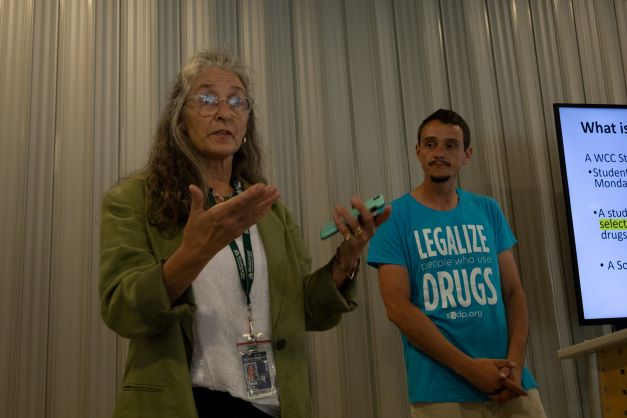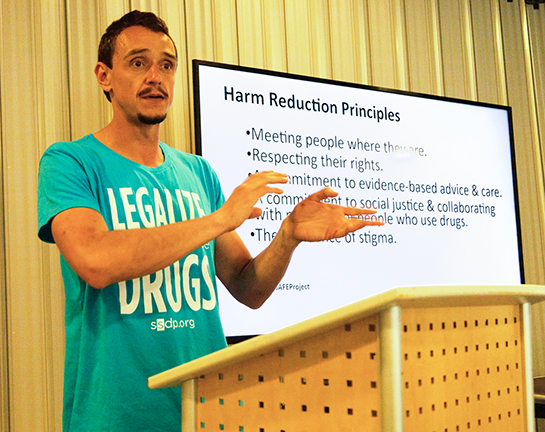By Jordan Scenna
Deputy Editor

Teresa Herzog and Matt Strang lead the CRP’s “Just Say Know” educational series, which covered information about harm reduction strategies.
Ruby Go | Washtenaw Voice
The WCC chapter of the Collegiate Recovery Program received a $5,600 grant from the Jamie Daniels Foundation in June. The JDF was founded by Ken Daniels, long-time announcer for the Detroit Red Wings, and his wife Lisa Daniels-Goldman. After losing their son Jamie to a Fentanyl overdose in 2016, the Daniels family formed the foundation to help children and young adults suffering from substance use disorder. In addition to the grant, a $10,000 scholarship fund will be made available to CRP students. Started in January 2019, CRP is a student-run organization that supports anyone seeking recovery from drugs, alcohol, or other mental health issues.
The scholarship won’t be available until fall 2024, but the group plans to use the grant money to host more social events to help create a supportive campus community and to inject some fun into recovery.
“CRP gives support, community, and connection for healing, and that’s real,” said Teresa Herzog, the program director for CRP. “We also want students to have some fun and have some swag.”
Past outings have included hiking and kayaking, but the infusion of grant money should spice up the options for this year. They’re currently brainstorming ideas and laser tag has been mentioned as one option.
Providing a safe and sober environment for students to have fun is only one of CRP’s goals. Some of the grant money is going toward the group’s “Just Say Know” educational series, which meets Wednesdays at noon in the Student Center, and is open to everyone. Harm reduction is the focus at the weekly meeting, where topics will include vaping, cannabis, alcohol, and prescription drugs.
Harm reduction is an approach to substance abuse that aims to educate people who use drugs on overdose prevention, infectious disease transmission, and physical and mental well-being. According to the federal Substance Abuse and Mental Health Service Administration, harm reduction strategies attempt to “meet people ‘where they are’ on their own terms, and may serve as a pathway to additional prevention, treatment, and recovery services.”
Matt Strang, a pre-med student at WCC, serves as the group’s peer educator and has spent a year on the executive board of the Students for Sensible Drug Policy at the University of Michigan. Strang, who’s in recovery himself, sees the CRP and harm reduction strategies as an integral part of helping people who might be dealing with substance abuse.
“We want to help [students] arrest anxiety at a young age with harm reduction,” Strang said.

Matt Strang, peer educator for the CRP, talks about harm reduction strategies. Ruby Go | Washtenaw Voice
Both Strang and Herzog want to create a safe space for people who don’t use drugs and alcohol, but also a place where students who do can come and talk about it without judgment.
“We want to educate people,” Herzog said. “If you vape and you want to stop, how do you do it? How do drugs affect you, and what are some guidelines for safer, lower risk use.”
The CRP is open to everyone on campus. Tyler Root, who joined the group in June as its graphic designer, is a recovery ally. A recovery ally is anyone who gives their support for people with substance abuse disorder.
“This was an opportunity to do important work and have a positive impact,” Root said. Root sees the CRP as not only a place for recovery from substance abuse, but anyone seeking “mental health and general wellness.”
The Collegiate Recovery Program meets every Monday at 4 p.m. in LA 229 and their “Just Say Know” educational series is held every Wednesday at noon in SC109 in the Student Center.
If anyone needs help with a substance-use disorder you can find resources here.

